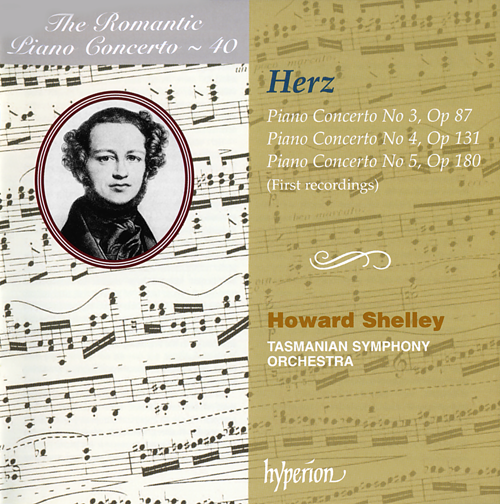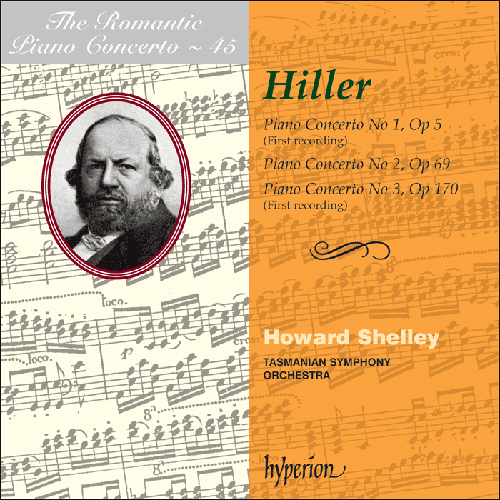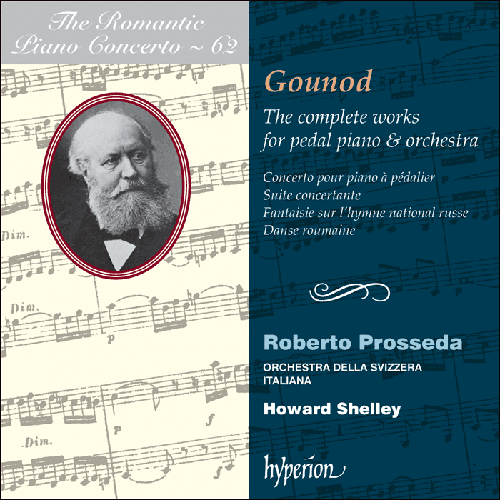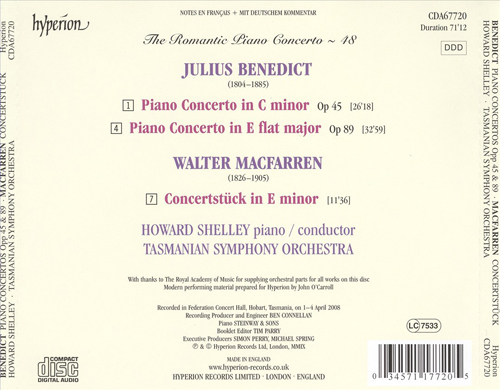25.4.24
15.1.22
MOSCHELES : Piano Concerto No 2 In E Flat Major • Piano Concerto No 3 In G Minor • Anticipations Of Scotland, Op 75 (Howard Shelley · Tasmanian Symphony Orchestra) (2002) Serie The Romantic Piano Concerto – 29 | FLAC (image+.cue), lossless
With this 29th volume in the Romantic Piano Concerto series we commence a cycle of three CDs that we hope will include all eight of Moscheles' piano concertos. It also marks the start of our exploration of concertos from the earlier part of the 19th century, which we have so far rather neglected.
Moscheles, though born in Prague, was a truly cosmopolitan figure. He studied in Vienna and then, after a short stay in Paris, settled in London for over 20 years before returning in 1846 to Leipzig where he spent the rest of his life. His musical roots were in the Viennese classics of Mozart and Beethoven and he was one of many pianist composers (other examples being Hummel and Kalkbrenner) who bridged the gap between the classical and the Romantic period but who were forgotten when the next wave of revolutionaries (Chopin, Liszt, Schumann) arrived. His concertos were written in the 1820's and 30's (the last in 1838) and therefore more than half were actually written in England. The first five (including the two here recorded) follow the traditional three movement pattern whereas the last three are shorter more thematically connected works, the third is undoubtedly his most famous and it remained in the repertoire throughout the 19th century.
Anticipations of Scotland is a pot-pourri of Scottish folk tunes that Moscheles wrote for performance in concerts he gave in Edinburgh in 1827.
We are delighted that Hyperion artist of old Howard Shelley has returned to us for this cycle of concertos. The wonderful understanding he has shown of Mozart and Hummel make him the ideal interpreter of this music in which he directs the Tasmanian Symphony Orchestra, of which he is a regular guest conductor, from the keyboard. Hyperion
Ignaz Moscheles (1794-1870)
Piano Concerto No 2 in E flat major Op 56 [30'54]
Piano Concerto No 3 in G minor Op 58 [29'26]
Anticipations of Scotland 'A grand fantasia' Op 75 [14'57]
Credits :
Orchestra – Tasmanian Symphony Orchestra
Piano, Conductor, Producer – Howard Shelley
14.1.22
MOSCHELES : Piano Concerto No 1, Op 45 • Piano Concerto No 6, Op 90 • Piano Concerto No 7, Op 93 (Howard Shelley · Tasmanian Symphony Orchestra) (2003) Serie The Romantic Piano Concerto – 32 | FLAC (image+.cue), lossless

For his final three concertos (6,7 & 8) Moscheles broke away from the traditional three-movement structure and produced works that presage Liszt in their combination of fast and slow movements in one structure. These works, written in London in the 1830s, show that at that time Moscheles, later regarded as a traditionalist, was then at the forefront of the developing Romantic movement in music. The lessons of Beethoven, so absent in his first concerto, are now clearly learned. Howard Shelley has already proved himself the perfect exponent of the repertoire which bridges the classical and romantic period in music. His first Moscheles recording (Concertos 2 & 3 and 'Anticipations of Scotland') has met with universal acclaim and this release will surely follow. Hyperion
Ignaz Moscheles (1794-1870)
Piano Concerto No 1 in F major Op 45 [22'11]
Piano Concerto No 6 in B flat major 'Fantastique' Op 90 [16'57]
Piano Concerto No 7 in C minor 'Pathétique' Op 93 [22'10]
Credits :
Orchestra – Tasmanian Symphony Orchestra
Piano, Conductor, Producer – Howard Shelley
HERZ : Piano Concerto No 1, Op 34 • Piano Concerto No 7, Op 207 • Piano Concerto No 8, Op 218 (Howard Shelley · Tasmanian Symphony Orchestra) (2004) Serie The Romantic Piano Concerto – 35 | FLAC (image+.cue), lossless

Over the years Herz has had a very bad press, a situation begun through the writings of Robert Schumann and continued ever since, yet in his day—and this was primarily in the early part of his life—his music outsold all rivals, and his tours, particularly as the first major pianist to visit the USA, brought him huge success. This dichotomy is easily explained: Herz never tried to be a ‘great’ artist, though he was often judged against such criteria; he was an entertainer. Of course the concerto lends itself perfectly to this role and his eight concertos are full of charm, almost operatic melody and scintillating virtuosity, their model is Hummel, though in the later works Herz put less emphasis on virtuosity and more on lyricism. If we can accept that music need not be profound to be enjoyed we should welcome this revival of these works, the pop music of their time.
Needless to say Howard Shelley, who has made such exceptional recordings of the concertos of Hummel and Moscheles, is just the man for the job. He will follow up this recording with a second disc of Herz next year. Hyperion
Henri Herz (1803-1888)
Piano Concerto No 1 in A major Op 34 [25'46]
Piano Concerto No 7 in B minor Op 207 [17'50]
Piano Concerto No 8 in A flat major Op 218 [14'14]
Credits :
Orchestra – Tasmanian Symphony Orchestra
Piano, Conductor – Howard Shelley
MOSCHELES : Piano Concerto No.4 In E Major • Piano Concerto No.5 in C Major • Recollections Of Ireland, Op.69 (Howard Shelley · Tasmanian Symphony Orchestra) (2005) Serie The Romantic Piano Concerto – 36 | FLAC (image+.cue), lossless

Piano Concerto No 4 represents the culmination of Moscheles’ output in the genre during his years as a touring virtuoso, and the results are every bit as pyrotechnical as this might lead one to expect. A precurser of the Chopin and Schumann concertos, here delicious melody and rumbustious joie de vivre combine (alongside a version of The British Grenadiers) in a work of immediate and lasting appeal.
The fifth concerto is something rather different, its audaciously progressive musical language initially proving something of a turn-off for contemporary audiences expecting ‘more of the same’. However, the work bristles with virtuosic display and strong themes – every bit a tribute to its composer’s idol, Beethoven, whose own C minor concerto provides the opening motif of Moscheles’ closing movement.
Recollections of Ireland is a crowd-pleasing fantasia based on four popular Irish tunes (‘The Groves of Blarney’ being better known today as ‘The Last Rose of Summer’) and provides Moscheles ample scope to indulge his passion for a good tune – and his facility at interweaving several good tunes …
The accompanying booklet gives full details of the works, of course, and also throws down the gauntlet to the interested listener: Hyperion is committed to recording the missing Piano Concerto No 8 – if anyone can shed any light on where the music might be, many years of international searching having so far drawn a blank. Hyperion
Ignaz Moscheles (1794-1870)
Piano Concerto No 4 in E major Op 64 [26'01
Piano Concerto No 5 in C major Op 87 [30'36]
Recollections of Ireland Op 69 [15'22]
Credits :
Orchestra – Tasmanian Symphony Orchestra
Conductor, Piano – Howard Shelley
HERZ : Piano Concerto No 3, Op 87 • Piano Concerto No 4, Op 131 • Piano Concerto No 5, Op 180 (Howard Shelley • Tasmanian Symphony Orchestra) (2006) Serie The Romantic Piano Concerto – 40 | FLAC (image+.cue), lossless

Henri Herz (1803-1888)
Piano Concerto No 3 In D Minor Op 87 (30:21)
Piano Concerto No 4 In E Major Op 131 (22:40)
Piano Concerto No 5 In F Minor Op 180 (15:59)
Credits :
Orchestra – Tasmanian Symphony Orchestra
Piano, Conductor – Howard Shelley
KALKBRENNER : Piano Concerto No 1, Op 61 • Piano Concerto No 4, Op 127 (Howard Shelley · Tasmanian Symphony Orchestra) (2005) Serie The Romantic Piano Concerto – 41 | FLAC (image+.cue), lossless

Friedrich Kalkbrenner (1785-1849)
Piano Concerto No 1 In D Minor (30:39)
Piano Concerto No 4 In A Flat Major Op 127 (28:17)
Credits :
Orchestra – Tasmanian Symphony Orchestra
Piano, Conductor – Howard Shelley
STERNDALE BENNETT : Piano Concerto No 4, Op 19 • Caprice In E Major, Op 22 ♦ BACHE : Piano Concerto In E Major, Op 18 (First Recording) (Howard Shelley · BBC Scottish Symphony Orchestra) (2007) Serie The Romantic Piano Concerto – 43 | FLAC (image+.cue), lossless

Sir William Sterndale Bennett (1816-1875)
Piano Concerto No 4 in F minor Op 19[27'23]
Francis Edward Bache (1833-1858)
Piano Concerto in E major Op 18[24'40]
Sir William Sterndale Bennett (1816-1875)
Caprice In E Major Op 22 (12:49)
Credits :
Orchestra – BBC Scottish Symphony Orchestra
Piano, Conductor – Howard Shelley
13.1.22
HILLER : Piano Concerto No 1, Op 5 (First Recording) • Piano Concerto No 2, Op 69 • Piano Concerto No 3, Op 170 (First Recording) (Howard Shelley · Tasmanian Symphony Orchestra) (2008) Serie The Romantic Piano Concerto – 45 | FLAC (image+.cue), lossless

Ferdinand Hiller (1811-1885)
Piano Concerto No 1 In F Minor Op 5 (24:22)
Piano Concerto No 2 In F Sharp Minor Op 69 (19:55)
Piano Concerto No 3 In A Flat Major 'Concerto Espressivo' Op 170 (31:39)
Credits :
Orchestra – Tasmanian Symphony Orchestra
Piano, Conductor – Howard Shelley
BENEDICT : Concerto In C Minor, Op 45 • Concerto In E Flat Major Op 89 ♦ MACFARREN : Concertstück (Howard Shelley · Tasmanian Symphony Orchestra) (2009) Serie The Romantic Piano Concerto – 48 | FLAC (image+.cue), lossless

The even-more-forgotten Walter Macfarren was the brother of better-known George, an early Principal of the Royal Academy of Music. Walter was for many years a piano professor there, his pupils including Matthay and Henry Wood. His music is very much in the style of Mendelssohn and his Concertstück proves to be a very attractive work which could easily pass as one by the greater master. Hyperion
Julius Benedict (1804-1885)
Piano Concerto In C Minor Op 45 (26:15)
Piano Concerto In E Flat Major Op 89 (32:59)
Walter Macfarren (1826-1905)
Concertstück In E Minor 11:36
Credits :
Orchestra – Tasmanian Symphony Orchestra
Conductor, Piano [Steinway & Sons] – Howard Shelley
TAUBERT : Piano Concerto No 1, Op 18 • Piano Concerto No 2, Op 189 (First Recording) ♦ ROSENHAIN : Piano Concerto In D Minor, Op 73 (First Recordings) (Howard Shelley · Tasmanian Symphony Orchestra) (2010) Serie The Romantic Piano Concerto – 51 | FLAC (image+.cue), lossless

Taubert’s A major Concerto was described by Schumann as ‘one of the best’ – he also noted the parallels between it and Mendelssohn’s Op 25. But these similarities, however, do not negate the marvellous and distinctive music contained within Taubert’s Concerto. Nearly half a century separates Taubert’s first concerto and his Piano Concerto No 2 in A major Op 189 (c1874), and the second concerto reflects developments in the areas of harmonic expansion, cyclic development, and, of course, increased virtuosity.
Rosenhain wrote two concerted for works for piano and orchestra, an the A minor Concertino Op 30 (probably written in the 1840s, though published later), and the work included on this disc, the Piano Concerto in D minor Op 73. This work is fairly conservative in its form, offering little that had not been heard before. Still, there is much gorgeous and masterful music within its traditional three-movement form.
Howard Shelley directs the Tasmanian Symphony Orchestra from the piano; a partnership that has garnered the highest praise for their previous Hyperion recordings. Hyperion
Wilhelm Taubert (1811-1891)
Piano Concerto No 1 In E Major Op 18 (22:45)
Piano Concerto No 2 In A Major Op 189 (23:38)
Jacob Rosenhain (1813-1894)
Piano Concerto In D Minor Op 73 (24:54)
Credits :
Orchestra – Tasmanian Symphony Orchestra
Piano, Conductor – Howard Shelley
12.1.22
KALKBRENNER : Piano Concerto No 2, Op 85 • Piano Concerto No 3, Op 107 • Adagio & Allegro Di Bravura, Op 102 (First Recordings) (Howard Shelley · Tasmanian Symphony Orchestra) (2012) Serie The Romantic Piano Concerto – 56 | FLAC (image+.cue), lossless

Tracklist :
Piano Concerto No 2 In E Minor Op 85 (32:58)
Composed By – Friedrich Kalkbrenner
Piano Concerto No 3 In A Minor Op 107 (24:11)
Composed By – Friedrich Kalkbrenner
Adagio Ed Allegro Di Bravura Op 102 11:03
Composed By – Friedrich Kalkbrenner
Credits :
Leader – Jun Yi Ma
Orchestra – Tasmanian Symphony Orchestra
Piano, Conductor – Howard Shelley
PIXIS : Concerto In C Major, Op 100 • Concertino In E Flat Major, Op 68 ♦ THALBERG : Concerto In F Minor, Op 5 (Howard Shelley · Tasmanian Symphony Orchestra) (2012) Serie The Romantic Piano Concerto – 58 | FLAC (image+.cue), lossless

Tracklist :
Piano Concerto In C Major Op 100 (26:12)
Johann Peter Pixis
Piano Concertino In E Flat Major Op 68 (18:17)
Johann Peter Pixis
Piano Concerto In F Minor Op 5 (25:37)
Sigismond Thalberg
Credits :
Conductor, Piano – Howard Shelley
Leader – Jun Yi Ma
Orchestra – Tasmanian Symphony Orchestra
11.1.22
DÖHLER : Concerto In A Major, Op 7 ♦ DREYSCHOCK : Morceau De Concert, Op 27 • Salut À Vienne, Op 32 (Howard Shelley · Tasmanian Symphony Orchestra) (2013) Serie The Romantic Piano Concerto – 61 | FLAC (image+.cue), lossless

Tracklist :
Piano Concerto In A Major Op 7 (1836) (28:27)
Composed By – Theodor Döhler
Morceau De Concert In C Minor Op. 27 (1845) 16:42
Composed By – Alexander Dreyschock
Salut À Vienne: Rondo Brilliant Op. 32 (1846) (10:55)
Composed By – Alexander Dreyschock
Credits :
Leader – Jun Yi Ma
Orchestra – Tasmanian Symphony Orchestra
Piano, Conductor – Howard Shelley
GOUNOD : The Complete Works For Pedal Piano & Orchestra (Roberto Prosseda · Orchestra della Svizzera Italiana · Howard Shelley) (2013) Serie The Romantic Piano Concerto – 62 | FLAC (image+.cue), lossless

Tracklist :
Suite Concertante In A Major (22:59)
Composed By – Charles Gounod
Concerto For Pedal Piano In E Flat Major (19:47)
Composed By – Charles Gounod
Fantaisie Sur L'Hymne National Russe 8:36
Composed By – Charles Gounod
Danse Roumaine 4:32
Composed By – Charles Gounod
Credits :
Conductor – Howard Shelley
Orchestra – Orchestra Della Svizzera Italiana
Piano – Roberto Prosseda
GODARD : Piano Concerto No 1, Op 31 • Piano Concerto No 2, Op 148 • Introduction And Allegro, Op 49 (Howard Shelley · Tasmanian Symphony Orchestra) (2014) Serie The Romantic Piano Concerto – 63 | FLAC (image+.cue), lossless

Tracklist :
Piano Concerto No 1 In A Minor Op 31 (29:53)
Composed By – Benjamin Godard
Piano Concerto No 2 In G Minor Op 148 (28:35)
Composed By – Benjamin Godard
Introduction And Allegro Op 49 (11:43)
Composed By – Benjamin Godard
Credits :
Leader – Jun Yi Ma
Orchestra – Tasmanian Symphony Orchestra
Piano, Conductor – Howard Shelley
HERZ : Piano Concerto No 2, Op 74 • Grande Polonaise Brillante, Op 30 • Fantaisie Et Variations Sur La Marche D'Otello De Rossini, Op 67 • Grande Fantaisie Militaire Sur La Fille Du Régiment, Op 163 (Howard Shelley · Tasmanian Symphony Orchestra) (2015) Serie The Romantic Piano Concerto – 66 | FLAC (tracks), lossless

Tracklist :
Piano Concerto No 2 In C Minor Op 74 (22:24)
Composed By – Henri Herz
Grande Fantaisie Militaire Sur La Fille Du Régiment Op 163 12:55
Composed By – Henri Herz
Fantaisie Et Variations Sur La Marche D'Otello De Rossini Op 67 15:45
Composed By – Henri Herz
Grande Polonaise Brillante Op 30 14:02
Composed By – Henri Herz
Credits :
Leader – Jun Yi Ma
Orchestra – Tasmanian Symphony Orchestra
Piano, Conductor – Howard Shelley
CZERNY : Piano Concerto In F Major · Piano Concerto In A Major · Rondo Brilliant (Howard Shelley • Tasmanian Symphony Orchestra) (2017) Serie The Romantic Piano Concerto – 71 | FLAC (tracks), lossless
Tracklist :
Piano Concerto In F Major Op. 28 (27:04)
Composed By – Carl Czerny
Piano Concerto In A Minor Op. 214 (31:11)
Composed By – Carl Czerny
Rondo Brilliant In B Flat Major Op. 233 (14:54)
Composed By – Carl Czerny
Credits :
Conductor, Piano – Howard Shelley
Leader – Emma McGrath
Orchestra – Tasmanian Symphony Orchestra

POTTER : Piano Concerto No. 2 In D Minor · Piano Concerto No. 4 In E Major · Variazioni di Bravura On A Theme By Rossini (Howard Shelley • Tasmanian Symphony Orchestra) (2017) Serie The Romantic Piano Concerto – 72 | FLAC (tracks), lossless

Tracklist :
Piano Concerto No. 2 In D Minor (1832) (28:40)
Composed By – Cipriani Potter
Piano Concerto No. 4 In E Major (1835) (30:12)
Composed By – Cipriani Potter
Variazoni di Bravura On A Theme By Rossini (1829) (15:03)
Composed By – Cipriani Potter
Credits :
Conductor, Piano – Howard Shelley
Orchestra – Tasmanian Symphony Orchestra
STERNDALE BENNETT : Piano Concertos 1, 2, & 3 (Howard Shelley · BBC Scottish Symphony Orchestra) (2018) Serie The Romantic Piano Concerto – 74 | FLAC (tracks+.cue), lossless

Tracklist :
Piano Concerto No 1 In D Minor Op 1 (23:33)
Composed By – William Sterndale Bennett
Piano Concerto No 2 In E Flat Major Op 4 (26:49)
Composed By – William Sterndale Bennett
Piano Concerto No 3 In C Minor Op 9 (29:08)
Composed By – William Sterndale Bennett
Credits :
Conductor, Piano – Howard Shelley
Leader – Laura Samuel
Orchestra – BBC Scottish Symphony Orchestra
+ last month
THE HOKUM BOYS & BOB ROBINSON — The Complete Recorded Works 1935-1937 In Chronological Order | DOCD-5237 | RM | FLAC (tracks), lossless
Although hokum had its heyday from 1928-31, the name of the Hokum Boys was revived for some recording dates during the years 1935-37. This C...
























.jpg)

.jpg)



